Have you ever been stuck in a situation where you lost your house door keys while traveling out of the city or abroad and you come to know about it just when you are back home?
Well, I have…..
To solve my issue, I had to approach a lock-picking expert to gain access to my house. While the lock picking expert was opening the door, one question kept hitting my mind about lockpick legality. Am I practicing an illegal act? “Is lock picking illegal?” or “Are lock Picking kits illegal?”
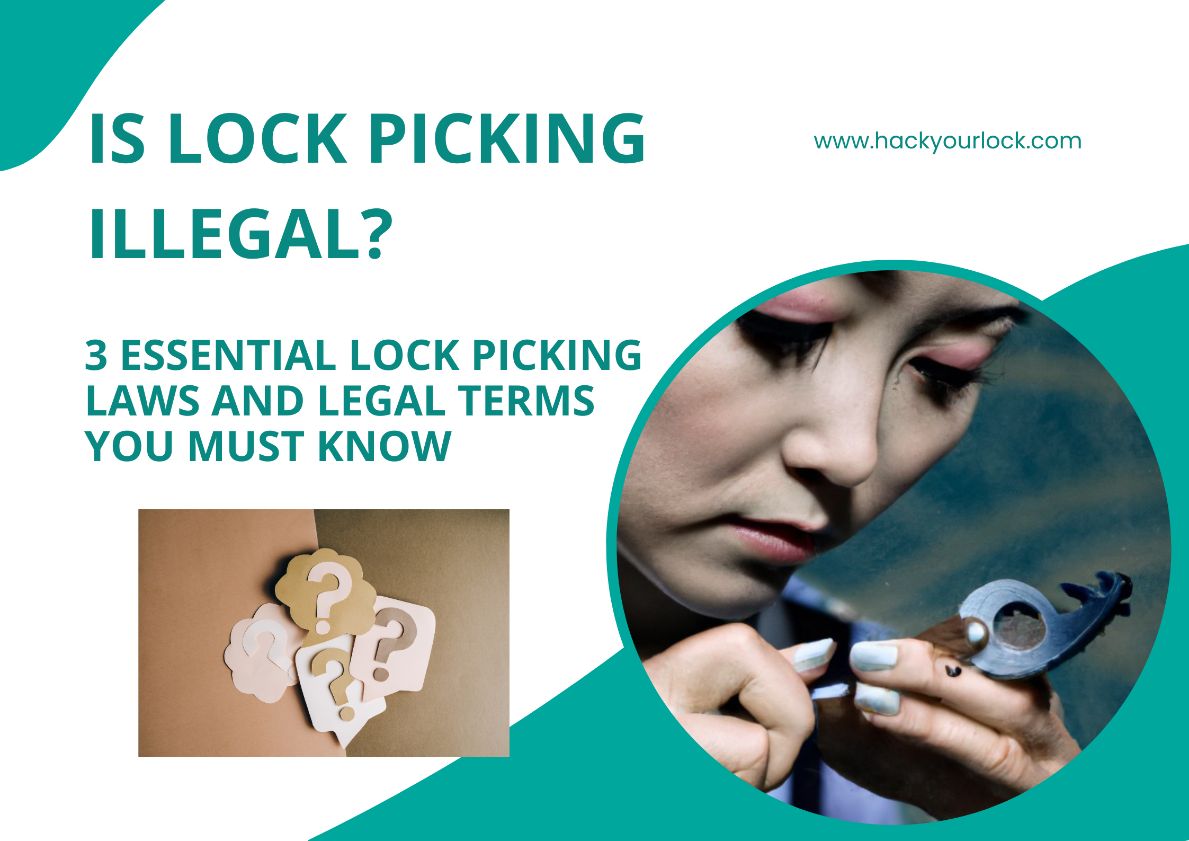
Later I came to know that the answer to this question depends on where you live and the laws in your area. In some places, it may be legal while in others it may be considered a crime. In this article, I will explore the legality or illegality of lock picking and explore 3 lock picking legality terms along with their application in different states.
Contents
- 1 Is lock picking Illegal In The USA?
- 2 3 Essential Lock Picking Laws and Legal Terms in the USA
- 3 Lock Picking Laws by States
- 4 Are Lock Picking Kits Illegal?
- 5 Reasons why it is illegal to own Lock Pick Sets & Bump Keys for Lock Picking?
- 6 Legal Consequences/Punishment for Lock-Picking in the US
- 7 Is Lock Picking Legal in Exceptional Circumstances?
- 8 Conclusion
- 9 FAQ’s
- 10 Resources
Is lock picking Illegal In The USA?
Lock picking is a technique used to open a lock without using a key. The process involves manipulating the internal components of the lock, such as the pins and tumblers, to release the locking mechanism
Now the first question which arises in your mind as a layman is that “Is lock picking illegal? Lock picking is legal in the USA when done with the owner’s permission or by a licensed locksmith. Lock picking is commonly employed by locksmiths and security professionals to gain access to a locked space or to test the strength and integrity of a lock’s security.
However, the legality of lock picking can be influenced by factors such as ownership of the property, the intent behind the lock picking, and the type of lock being picked.
If lock picking is done with the intent to commit a crime, it is considered illegal. Lock picking kits are also illegal if kept with an intent to commit a crime according to various lock picking laws.
Using lock picking tools with criminal intent is illegal in the USA and can result in serious consequences. Some countries and states have specific laws that address the legality of lock picking. In some places, possessing lock picking tools without a legitimate reason can result in criminal charges and challenge lockpick legality.
Lock picking itself is not inherently illegal, whether it is legal or illegal to pick a lock depends on the circumstances in which it is being used. It is important to be aware of the lock picking laws in your area and use lock picking tools responsibly to avoid any legal consequences.
3 Essential Lock Picking Laws and Legal Terms in the USA
Lock picking is a skill that locksmiths and security experts may find useful, but it may also be abused for illegal purposes. Because of this, laws governing the ownership and use of lock picking equipment and methods can be complicated and differ from one country to the other.
We must dissect three clear legal definitions which help in figuring out is lock picking illegal or not and also control the possession of locksmith instruments to understand the laws of lock picking and lockpick legality.
Must Show Intent
Lock picks are considered to be tools like bump keys, screwdrivers or hammers by the law, and possessing them is completely legal in the majority of US states and other countries.

Problems only occur when lock picking equipment is used for illicit purposes, in which case the prosecution must demonstrate that the user intended to commit a crime.
Lock picking tools can be owned and possessed by people without running afoul of the lock picking laws as long as they are used for lawful activities like carrying out a vocational or recreational activity.
Prima Facie Evidence
The presence of lock picking equipment is viewed in certain places as prima facie evidence of criminal intent as far as lockpick legality is concerned. This means that the sheer fact that someone owns these tools automatically raises the suspicion that they will be used for criminal purposes.

In these situations, it is the accused’s responsibility to prove that they had a legal justification for owning the lock picking equipment, such as being a locksmith or engaging in lock picking as a pastime.
This inference, however, can be contested in court, and the defendant may be able to demonstrate that they had a legal justification for having the equipment, such as being a hobbyist or locksmith. It is advisable that you leave any tools you purchase or already own at home if you visit these states.
No Specific Law
There may not be any particular regulations governing the ownership or use of lock picking equipment in some states and jurisdictions (such as North Dakota). In some places, everyday tools like screwdrivers or hammers are treated similarly to lock picking tools.
However, it is essential to ask the question, “is lock picking illegal?” Lock picking tools can be owned and used legally as long as they are not put to use against the law or to commit a crime.
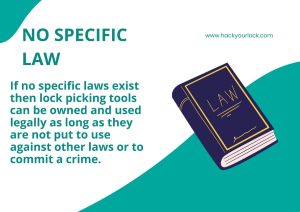
It is crucial to remember that even with the lack of specific rules governing lock picking instruments and lockpick legality, using these tools for illicit reasons may still lead to criminal penalties.
Lock Picking Laws by States
Laws and regulations surrounding lock picking in different states vary widely. Some states have specific laws regarding the possession and use of lock picking tools (lockpick legality), while others treat them like any other common tool.
If you want to figure out ” Is lockpicking illegal? “, it is essential to research the laws in your state before buying or possessing lock picking tools to ensure you are not breaking any laws or regulations. Now let’s identify is lock picking illegal in different states of the USA or not by figuring out lock pick laws by state.
The details about various states have been discussed below:
Legal states
Lock pick laws by state are first divided into legal states. The legality of lock picking has been classified according to 3 aspects in different states as follows:
- Legal- No specific laws
- Legal if not concealed
- Legal – Not legal for profit
- Other legal states with “must show intent”
1. Legal- No specific laws
Arkansas, Indiana, North Dakota, Pennsylvania, and West Virginia
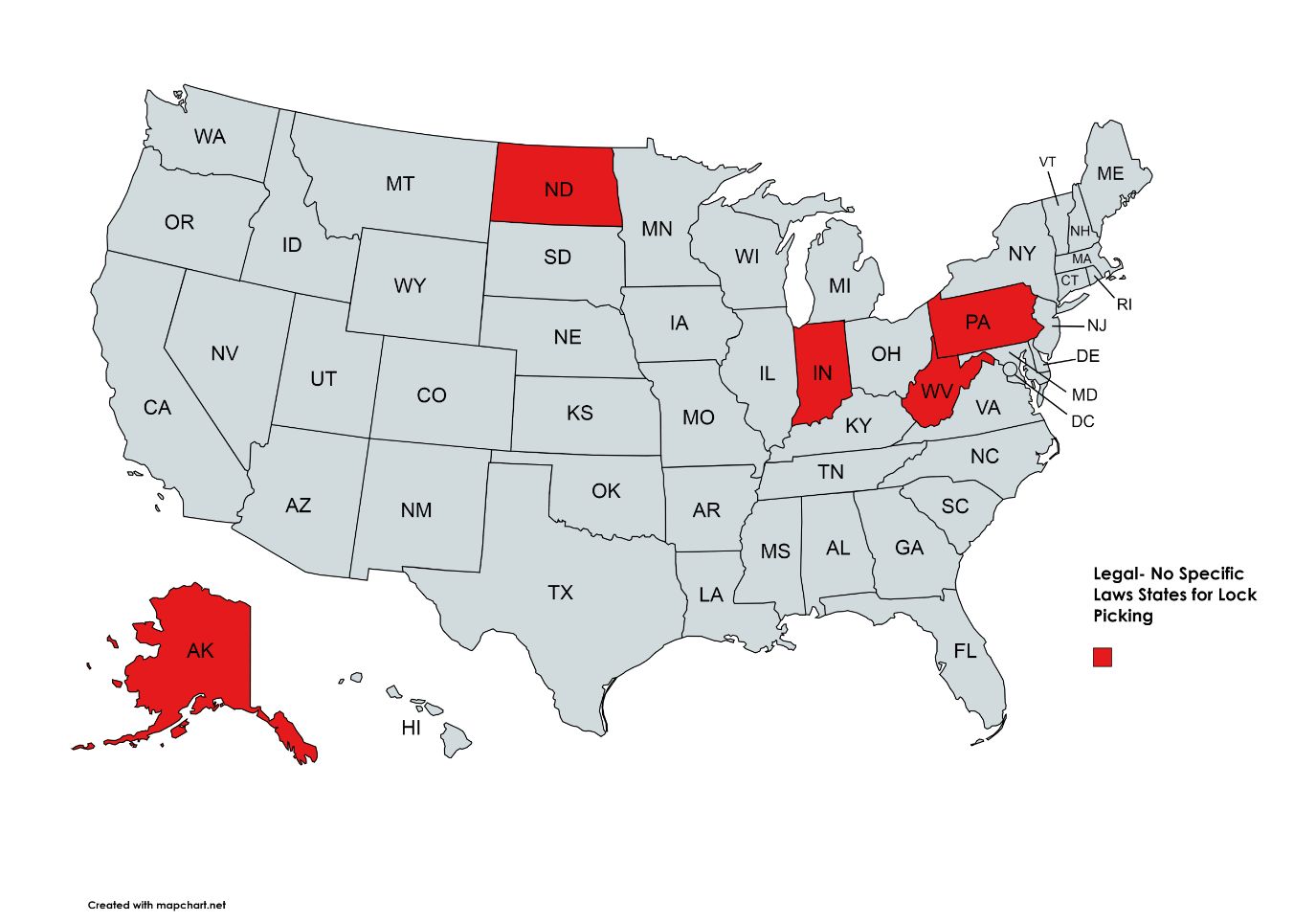
First classification of lock pick laws by state in legal states is of states with no specific laws. In the state of Arkansas, Indiana, North Dakota, Pennsylvania, and West Virginia, there are no specific laws that regulate the possession or use of lock picking tools. Therefore, lock picks or lock picking kits are not illegal and are generally considered legal in the state.
This lack of regulation can be attributed to the absence of any substantial statute that specifically addresses lock picking tools.
However, it is important to note that using lock picks for illegal purposes can still result in criminal charges, even in the absence of specific laws regulating their possession and use. As such, individuals should use lock picks like bump keys responsibly and only for lawful purposes.
North Carolina
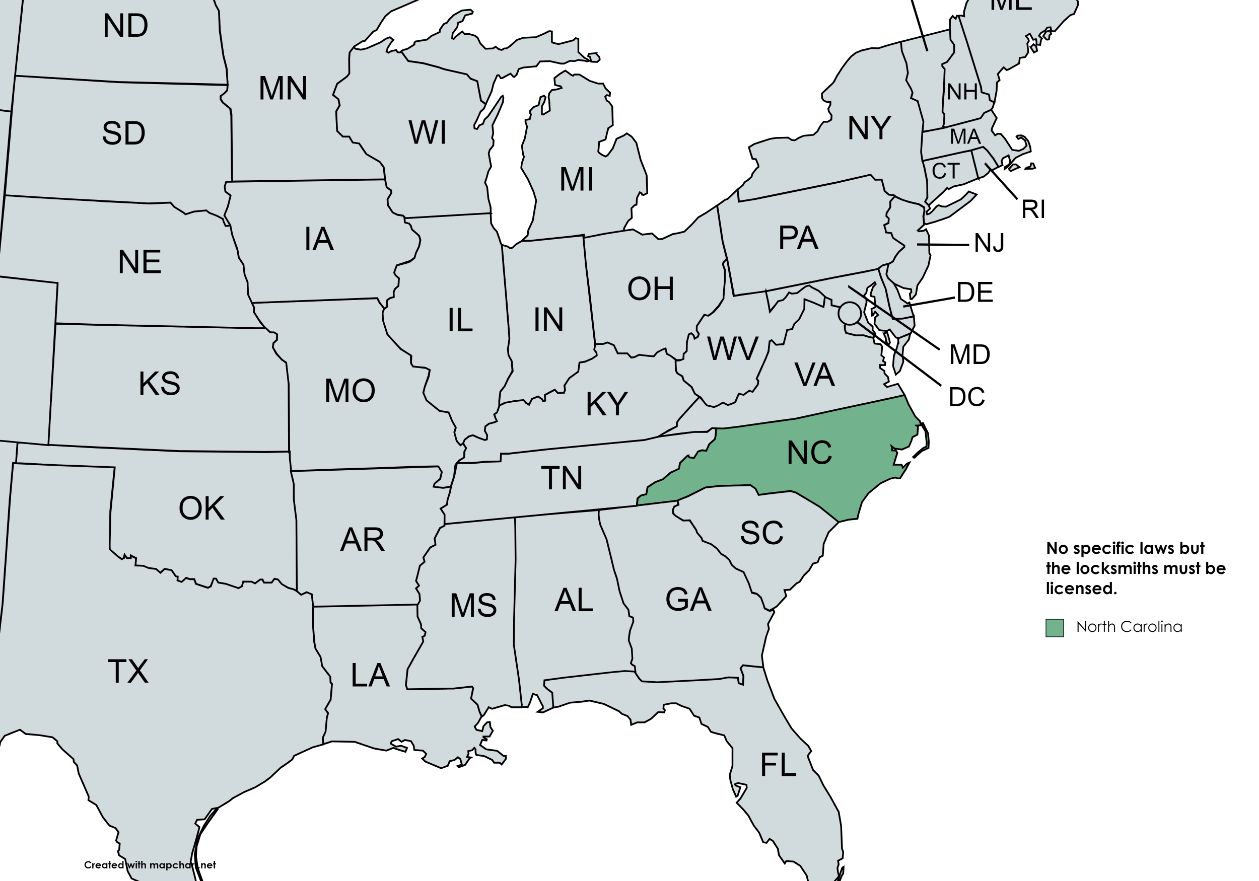
There are no specific laws but the locksmiths must be licensed. Although lock picking demonstrations should always be free in North Carolina even though possession is not a crime there, they should never be considered “locksmith services.” There is a Locksmith Licensing Board, and locksmiths are required to have licenses.
2. Legal if not concealed
Mississippi
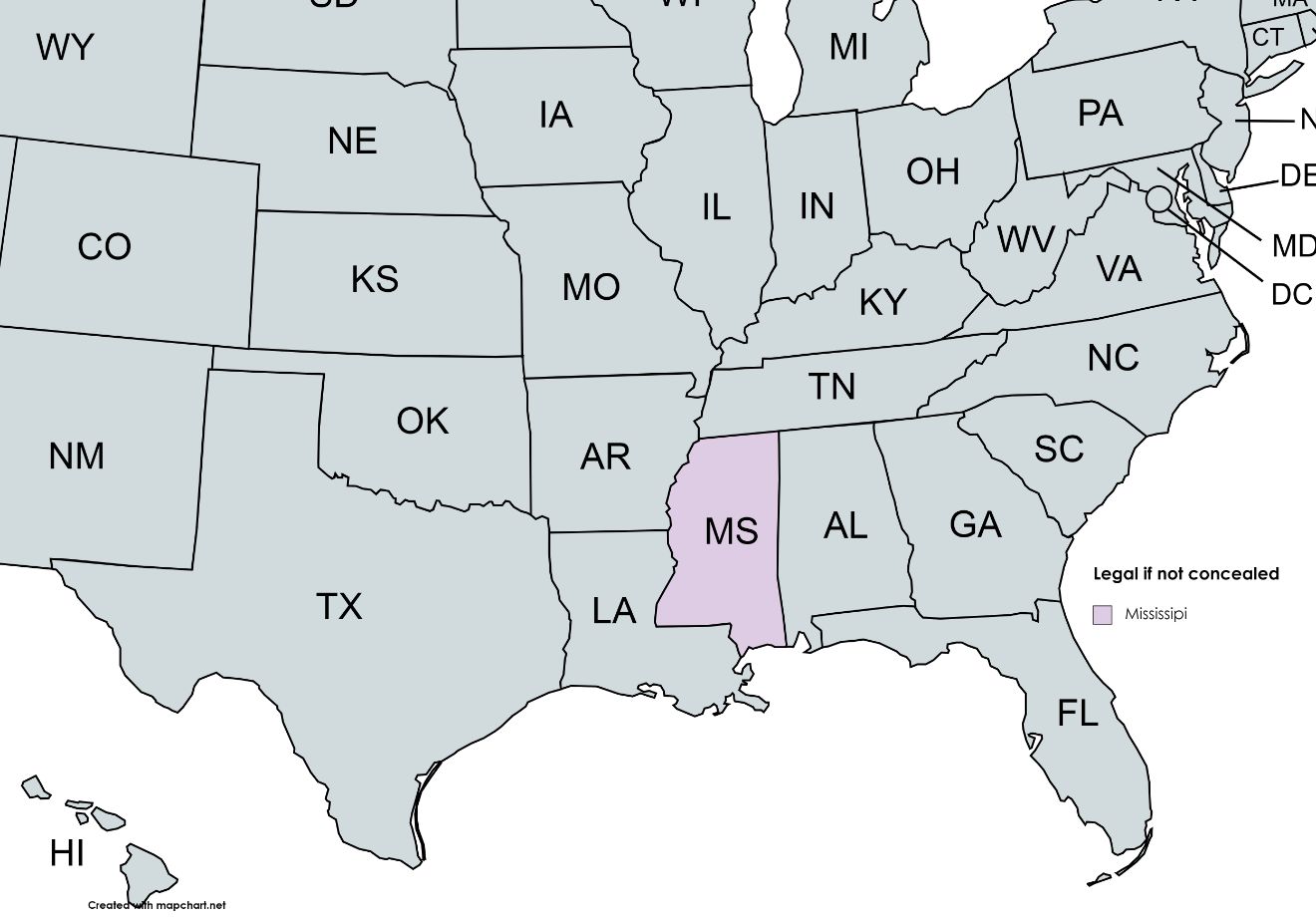
Second classification of lock pick laws by state in legal states is of states which are Legal if not concealed. In Mississippi, owning and possessing lock picking kits is not illegal and is legal as long as they are not concealed.
However, if the picks are concealed, the possessor may have to counter prima facie evidence of intent to commit a crime. This means that simply having concealed lock picking tools creates a presumption of intent to use them for illegal purposes. This simplifies the query “Is lockpicking illegal?”
Therefore, the burden of proof falls on the accused to prove lockpick legality and that they had a legitimate reason for possessing the tools, such as being a locksmith or practicing lock picking as a hobby under lock picking laws.
3. Legal – Not legal for Profit
Tennessee
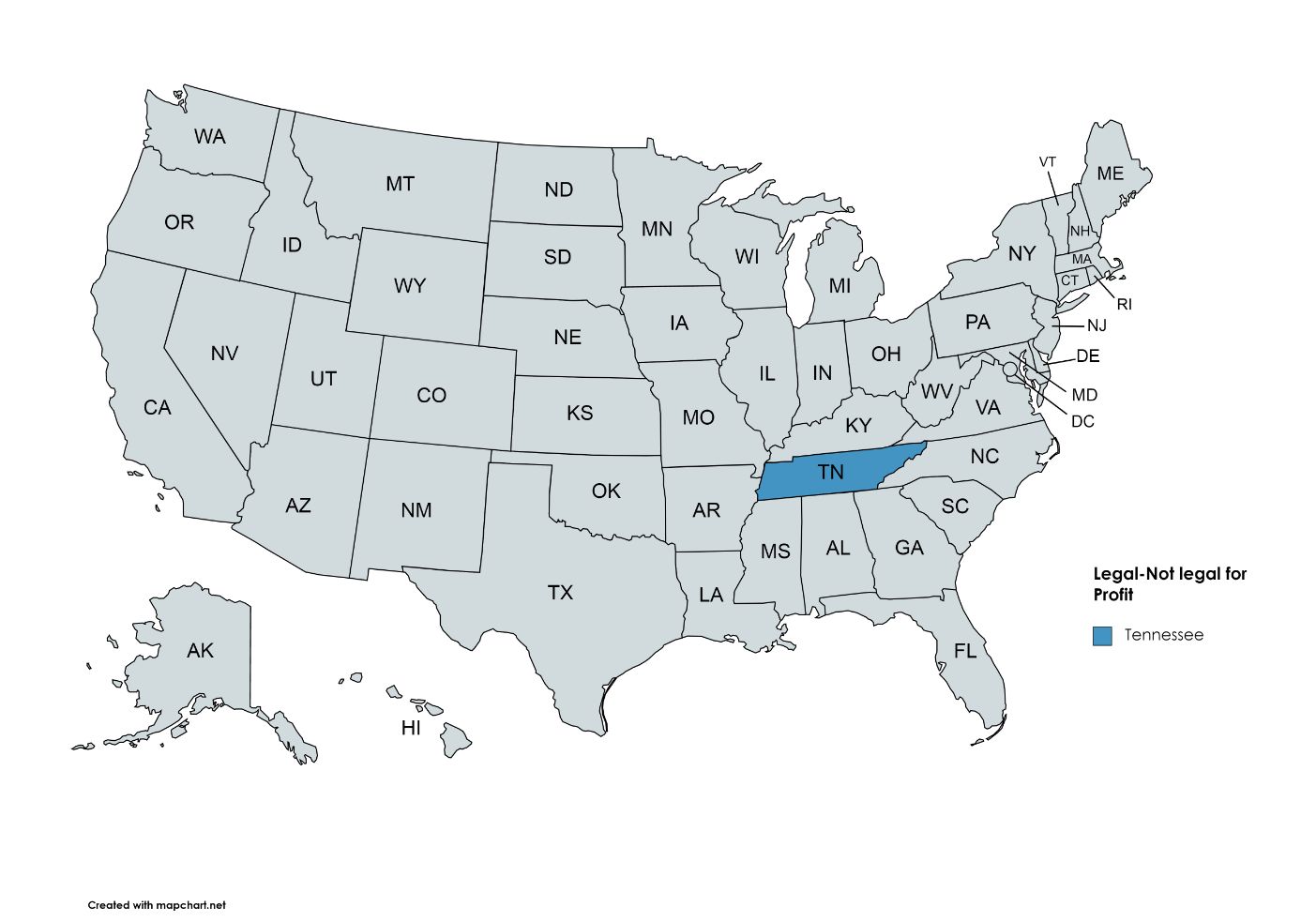
Third classification of lock pick laws by state in legal states is of states which are Legal but Not legal for Profit. Possession of lock picks or lock picking kits is not illegal and therefore it is legal in Tennessee.
The state, on the other hand, has severe rules in place to prevent locksmith fraud. Unless the individual is a qualified locksmith, it is unlawful to employ lock picking talents for profit.
This means that non-licensed individuals who use lock picking tools for monetary gain can face serious criminal charges. It is important to note that the licensing requirements in Tennessee include background checks, fingerprinting, and completion of a training program.
Any individual who is interested in becoming a licensed locksmith in Tennessee should be prepared to meet these requirements to avoid legal consequences as per lock picking laws..
4. Other legal states with “must show intent”
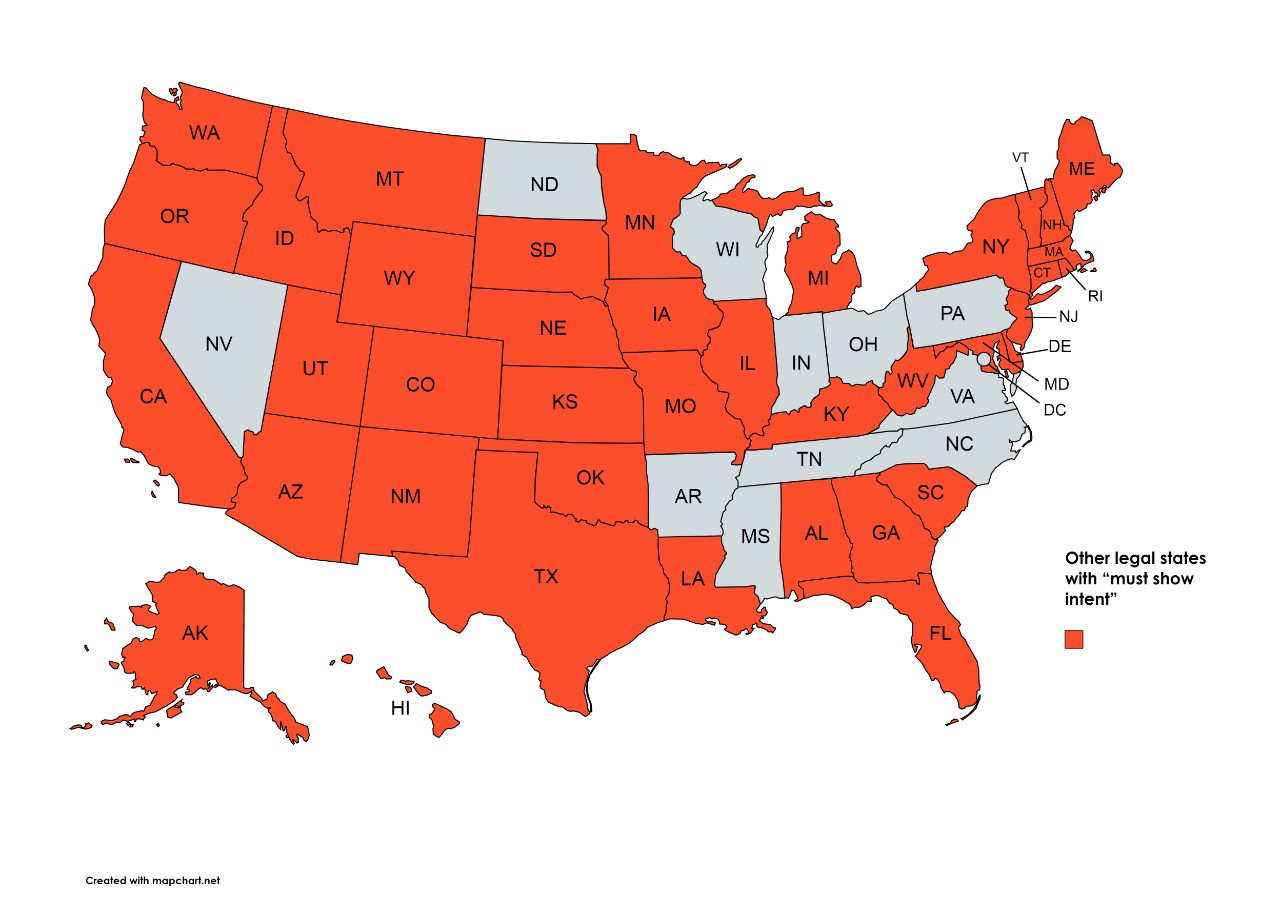
Fourth classification of lock pick laws by state in legal states is of Other legal states with “must show intent”. Lockpick legality is much clearer in these states.
| State | Law | Interpretation |
| Alabama | 2009 Alabama code title 13a — criminal code. Chapter 7 — offenses involving damage to and intrusion upon the property. Section 13a-7-8 possession of burglar’s tools. |
According to this law, a person is guilty of this crime if they possess any item that is designed or commonly used for breaking into a place or stealing something, such as an explosive, tool, or instrument. Additionally, to be charged with this crime, the person must have the intent to use the item for committing such an offense. This means that simply having the item alone is not enough to be convicted of the crime; there must also be evidence of intent to use it for illegal purposes. So lock picking is legal and must show intent. |
| Alaska | 2011 Alaska statutes title 11. Criminal law Chapter 11.46. Offenses against property sec. 11.46.315. Possession of burglary tools. |
This paragraph outlines the crime of possession of burglary tools, which is committed when someone has a tool that could be used for burglary and intends to use or allow someone else to use that tool for breaking into a place with the intent to commit a crime. Possession of burglary tools is considered a Class A misdemeanor, meaning it is a relatively minor offense but still carries legal consequences. This law aims to discourage individuals from possessing or using tools that could be used for burglary, even if they have not yet committed the actual act. So lock picking is not illegal otherwise with a display of intent. |
| Arizona | 2011 Arizona revised statutes title 13 criminal code 13-1505 possession of burglary tools; master key; manipulation key; classification |
This passage outlines the crime of possession of burglary tools in two parts. The first part states that possessing any item that is commonly used for burglary, such as a tool or explosive, to use it to commit burglary is considered possession of burglary tools. The second part specifies that buying, selling, transferring, possessing, or using a motor vehicle manipulation key or master key is also considered possession of burglary tools. However, there are exceptions to this rule, such as using a master key as part of a lawful business or occupation, including licensed vehicle dealers and manufacturers, locksmiths, and law enforcement. Additionally, possessing or using no more than one manipulation key is allowed, unless it is done with the intent to commit theft or a felony. This law is in place to discourage the possession and use of tools that could be used for burglary and to hold those who possess such tools accountable. |
| California | 2011 California code penal code part 1. Of crimes and punishments [25 – 680] Chapter 3. Burglarious and larcenous instruments and deadly weapons |
Section 466 states that possessing lock picking tools with the intent to commit a felony is a misdemeanor offense. Section 466.1 requires anyone selling or providing lock picking tools to record the purchaser’s personal information and keep a copy of the sale for one year, which can be inspected by law enforcement. Violating this section is also considered a misdemeanor offense. So lock picking or lock picking kits are not illegal otherwise. |
| Colorado | 2016 Colorado Revised Statutes Title 18 – Criminal Code Article 4 – Offenses Against Property Part 2 – Burglary and Related Offenses § 18-4-205. Possession of burglary tools |
If someone possesses any tool or explosive that is commonly used for committing theft or breaking into premises with the intent to use it in such an offense, it is considered possession of burglary tools, which is a class 5 felony. So lock picking is not illegal otherwise. |
| Connecticut | 2011 Connecticut Code Title 53a Penal Code Chapter 952 Penal Code: Offenses |
Possessing or making tools, instruments, or things commonly used for committing burglaries or breaking into safes or other property containers is a misdemeanor if the person intends to use them or knows they will be used for such offenses. This makes lock picking legal otherwise. |
| Delaware | 2012 Delaware code title 11 – crimes and criminal procedure Chapter 5. Specific offenses subchapter iii. Offenses involving property § 828. Possession of burglar’s tools or instruments facilitating theft; class f felony. |
If a person possesses any tool, instrument, or other object that is commonly used for committing theft or breaking into a property, and there is evidence that the object was intended to be used in such an offense, the person can be charged with possession of burglar’s tools. This applies to cases of unlawful entry, disabling security devices, and other similar offenses. Possession of such tools is considered a class F felony. |
| Florida | 2013 Florida statutes title xlvi – crimes Chapter 810 – burglary and Trespass 810.06 – possession of burglary tools. |
Possessing a tool with intent to use it for burglary or trespass is a third-degree felony.
Otherwise, this narrates that lock picking is not illegal.
|
| Georgia | 2010 Georgia Code Title 16 – Crimes And Offenses Chapter 7 – Damage To And Intrusion Upon Property Article 2 – Criminal Trespass And Damage To Property Part 1 – General Provisions § 16-7-20 – Possession Of Tools For The Commission Of Crime |
If a person has tools or devices that are commonly used to commit a crime like burglary or theft to use them for a crime, then they will be charged with the possession of tools for the commission of crime. The punishment for this crime is imprisonment for a period of one to five years. The purpose of possession makes lock picking legal if used for sports or hobbies or as a professional. |
| Hawaii | 2010 Hawaii Code Division 5. Crimes And Criminal Proceedings Title 37. Hawaii Penal Code 708. Offenses Against Property Rights |
A person is guilty of possessing burglar’s tools if they knowingly have any tool or instrument commonly used for breaking into a property or stealing, with the intent to use it for such a crime. This offense is a misdemeanor. Otherwise, lock picking is legal. |
| Idaho | 2011 Idaho Code Title 18 Crimes And Punishments Chapter 14 Burglary 18-1406 Possession Of Burglarious Instruments. |
It’s a misdemeanor to possess tools like picklocks, keys, or crowbars to break into a building or to make or alter a key without permission. It’s also illegal to make, alter, or repair any tool or thing knowing it will be used in a crime. Possession otherwise as a hobby is legal |
| Illinois | 2010 Illinois Code CHAPTER 720 CRIMINAL OFFENSES 720 ILCS 5/ Criminal Code Of 1961. Article 19 – Burglary Sec. 19‑2. Possession Of Burglary Tools. |
A person is guilty of possession of burglary tools if they have in their possession any key, tool, instrument, or explosive suitable for breaking into a building, vehicle, or depository to commit a felony or theft. Possession of a key designed for lock bumping may be considered evidence of intent to commit a felony or theft. Legality stays at the mark of the intent. |
| Iowa | 2011 Iowa Code Title Xvi Criminal Law And Procedure Subtitle 1 Crime Control And Criminal Acts Chapter 713 Burglary 713.7 Possession Of Burglar’s Tools. |
If someone has a key, tool, instrument, or explosive to use for burglary, they are committing an aggravated misdemeanor. |
| Kansas | 2011 Kansas Code Chapter 21. – Crimes And Punishments Article 25. – Identification And Detection Of Crimes And Criminals |
if a person is arrested and found in possession of firearms, concealed weapons, burglary tools, high explosives, or any other criminal tools, the law enforcement agency must immediately take two sets of fingerprint impressions and one set of palm print impressions. |
| Kentucky | 2011 Kentucky Revised Statutes Chapter 511 Burglary And Related Offenses |
A person commits the offense of possession of burglar’s tools if they possess any tool or instrument that is commonly used to commit a burglary or theft, with the intent to use it for such a purpose or knowing that someone else intends to use it for such a purpose. Possession of burglar’s tools is a Class A misdemeanor. |
| Louisiana | 2011 Louisiana Laws Revised Statutes Title 14 — Criminal Law§95. Illegal Carrying Of Weapons |
A person commits the offense of illegal carrying of weapons if they own, possess, have custody of, or use any tools, dynamite, nitroglycerine, explosives, or other instruments commonly used by thieves or burglars with the intent to commit a crime. Intent makes all lock picking tools legal or illegal. |
| Maine | 2011 Maine Revised Statutes Title 17-A: Maine Criminal Code Chapter 17: Burglary And Criminal Trespass |
A person is guilty of possession or transfer of burglar’s tools if they possess or make any tool commonly used for breaking into the property, with intent to use it for a criminal offense or transfer or possesses with intent to transfer any such device knowing it will be used for a criminal offense. Intent determines the illegality or legality of the tools. |
| Maryland | 2010 Maryland Code Criminal Law Title 6 – Crimes Against Property Subtitle 2 – Burglary And Related Crimes |
It is illegal to possess a burglar’s tool to use it to violate this subtitle. so otherwise it’s legal to carry lock picking tools. |
| Massachusetts | 2010 Massachusetts Code Part Iv Crimes, Punishments, And Proceedings in Criminal Cases Title I Crimes And Punishments Chapter 266 Crimes Against Property Section 49 Burglarious Instruments; Making; Possession; Use |
Possessing or making tools for breaking into buildings or vehicles with intent to commit a crime is punishable by up to 10 years in prison or a fine of up to $1,000 and up to 2.5 years in jail. This includes possession of a master key for stealing vehicles. Otherwise, lock picking is not illegal. |
| Michigan | 2011 Michigan Compiled Laws Chapter 750 — Michigan Penal Code Act 328 Of 1931 — The Michigan Penal Code (750.1 – 750.568) 328-1931-Xvi — Chapter Xvi Breaking And Entering (750.110…750.116) 750.116 Burglar’s Tools; Possession. |
Possession of burglar’s tools with intent to use them for stealing money or property is a felony, punishable by imprisonment in the state prison for up to 10 years. Is lock picking illegal? No |
| Minnesota | 2011 Minnesota Statutes Chapters 609 – 624 — Crimes, Criminals Chapter 609 — Criminal Code Section 609.59 — Possession Of Burglary Or Theft Tools |
Possession of any device or explosive with the intent to commit burglary or theft may result in a maximum sentence of three years imprisonment or a fine of up to $5,000, or both. Is lock picking illegal? No |
| Missouri | 2011 Missouri Revised Statutes Title Xxxviii Crimes And Punishment; Peace Officers And Public Defenders Chapter 569 Robbery, Arson, Burglary, And Related Offenses Section 569.180. Possession Of Burglar’s Tools. |
A person is guilty of possessing burglar’s tools if they have a tool, instrument, or article commonly used for breaking into premises, with intent to use or knowing someone else intends to use it for such a crime. This is a class D felony. In general, Is lock picking illegal? No, it is legal. Intention is the key. |
| Montana | 2011 Montana Code Annotated Title 45. Crimes Chapter 6. Offenses Against Property Part 2. Criminal Trespass And Burglary 45-6-205. Possession Of Burglary Tools. |
Possession of burglary tools is committed when a person knowingly possesses any tool, key, device, explosive, or instrument suitable for breaking into an occupied structure, vehicle, or safe, with the intent to commit an offense.
The penalty for possession of burglary tools is a fine of up to $500, imprisonment in the county jail for up to 6 months, or both. |
| Nebraska | 2009 Nebraska Code Chapter 28 Crimes And Punishments 28-508 Possession Of Burglar’s Tools; Penalty. |
Having any explosive, tool, or instrument adapted for breaking into premises or committing theft by physical means is a Class IV felony if the possessor intends to use it for such purposes or knows someone who does. Otherwise is lock picking illegal? No. |
| New Hampshire | 2010 New Hampshire Statutes Title Lxii Criminal Code Chapter 635 Unauthorized Entries Section 635:1 Burglary – |
It is a misdemeanor for a person to possess, make, or mend an engine, machine, tool, or implement designed to break open a building, safe, or other depository to commit a crime, with the intent to use or allow it to be used for that purpose. Intent makes lock picking legal or illegal. |
| New Jersey | 2013 New Jersey Revised Statutes Title 2c – The New Jersey Code Of Criminal Justice Section 2c:5-5 – Burglar’s Tools |
Anyone who makes or possesses any tool, machine, or implement commonly used to commit or facilitate a crime involving forcible entry into premises, or any offense listed in chapter 20 of this Title, is guilty of an offense. This includes knowing that the tool is designed or commonly used for such purposes, and intending to use or provide it to someone who intends to use it for such purposes. |
| New Mexico | 2011 New Mexico Statutes Chapter 30: Criminal Offenses Article 16: Larceny, 30-16-1 Through 30-16-48 Section 30-16-5: Possession Of Burglary Tools. |
Possession of burglary tools is having a device for burglary with intent to use. It’s a fourth-degree felony. Lock picking is legal |
| New York | 2006 New York Code – Possession Of Burglar\’S Tools. | Possession of burglar’s tools is having any tool or instrument used for breaking into a building and intending to use it for such an offense. It is a class A misdemeanor. Is lock picking illegal as per this? No intent makes it legal or illegal. |
| Oklahoma | 2006 Oklahoma Code – Title 21. Crimes And Punishments | A person previously convicted of burglary who possesses, transports, or conceals three or more specified tools with intent to use them for a crime, or knowing they will be used for a crime, is guilty of a felony. The specified tools are sledgehammers, pry bars, punches, chisels, and bolt cutters. Now the question arises is lock picking illegal in Oklahoma? The answer is no it is legal but intent plays a major role in this. |
| Oregon | 2011 Oregon Revised Statutes Ors Volume 4, Chapters 131 – 170 Ors Chapter 164 164.235 Possession Of A Burglary Tool Or Theft Device. |
Possession of a burglary tool or theft device is a crime if a person possesses such a tool or device and intends to use it to commit forcible entry or theft, or knows someone who intends to use it for that purpose. Burglary tools or theft devices include devices capable of burning through steel, concrete, or other material, as well as explosives, tools, instruments, or other articles adapted or designed for forcible entry or theft. Possession of such tools or devices is a Class A misdemeanor. |
| Rhode Island | 2010 Rhode Island Code Title 11 Criminal Offenses Chapter 11-8 Burglary And Breaking And Entering § 11-8-7 Making, Repairing, Or Possessing Burglar Tools. |
Possession or use of tools for breaking to steal or commit any crime is a crime punishable by up to ten years in prison. If held as a hobby or sport, is lock picking illegal too? No as per law interpretation lock picking is legal. |
| South Carolina | 2010 South Carolina Code Of Laws Title 16 – Crimes And Offenses Chapter 11 – Offenses Against Property |
It’s illegal to make, mend or possess tools or implements like false keys, picklocks, and nitroglycerine with the intent to use them for burglary, larceny, safecracking, or any other crime. Doing so is a felony punishable by a fine, imprisonment for up to five years, or both. No Criminal intent makes lock picking legal. |
| South Dakota | 2011 South Dakota Code Title 22 Crimes Chapter 32. Burglary And Unlawful Entry §22-32-17 Possession Of Weapon Or Tools With Intent To Commit Burglary–Felony. |
Having a weapon or tool specifically designed for burglary, or an explosive useful for burglary, with intent to commit burglary is a Class 6 felony. |
| Texas | 2009 Texas Code Penal Code Title 4. Inchoate Offenses Chapter 16. Criminal Instruments, Interception Of Wire Or Oral Communication, And Installation Of Tracking Devices |
Possessing or manufacturing a “criminal instrument,” which is any tool or item specifically designed or adapted for committing a crime, with intent to use or aid in the commission of a crime is an offense. This includes the possession, manufacture, sale, installation, or setup of such an instrument. No Criminal intent makes lock picking legal |
| Utah | 2011 Utah Code Title 76 Utah Criminal Code Chapter 6 Offenses Against Property 76-6-205. Manufacture Or Possession Of Instrument For Burglary Or Theft. |
If someone has or creates a tool, device, or another thing commonly used to commit a crime, to use it or knowing someone else will use it to commit burglary or theft, they’re guilty of a class B misdemeanor. |
| Vermont | 2011 Vermont Code Title 13 Crimes And Criminal Procedure Chapter 23 Burglary § 1204 Making Or Having Burglar’s Tools |
A person who possesses or manufactures a tool or device designed for breaking into a building or depository with the intent to steal property, and knows that it is intended for that purpose, may be imprisoned for up to 20 years, fined up to $10,000, or both. |
| Washington | 2011 Washington Code Title 9a Washington Criminal Code 9a.52 Burglary And Trespass. 9a.52.060 Making Or Having Burglar Tools. |
Anyone who creates, fixes, possesses, or controls any tool, machine, key, or other device that is commonly used to commit burglary, to use or allow it to be used for burglary, or knowing it will be used for that purpose, is guilty of making or having burglar tools. This is considered a gross misdemeanor. |
| Wisconsin | 2011 Wisconsin Code Chapter 943. Crimes Against Property. 943.12 Possession Of Burglarious Tools. |
Anyone who possesses any device or tool specifically intended or adapted for breaking into a depository or building with the intent to use it to steal valuables is guilty of a Class I felony. |
| Wyoming | 2011 Wyoming Statutes Title 6 – Crimes And Offenses Chapter 3 – Offenses Against Property 6-3-304. Possession Of Burglar’s Tools; Penalties. |
If a person possesses an explosive, tool, instrument, or any other article that is commonly used to commit or facilitate the commission of a crime that involves forcibly entering buildings or occupied structures, and if they have the intent to use the article for committing such a crime, then they are guilty of possession of burglar’s tools.is lock picking illegal without criminal intent? No, it becomes legal if practiced with professional intent or as a hobby or sport. |
Illegal states – prima facie evidence
Lock pick laws by state having status of Illegal states – prima facie evidence, have laws that restrict the possession of lock picking tools with the intent to use them for criminal activities. Among lockpick laws, you get more clarity here about lockpick legality, specifically, ” Is lockpicking illegal?”
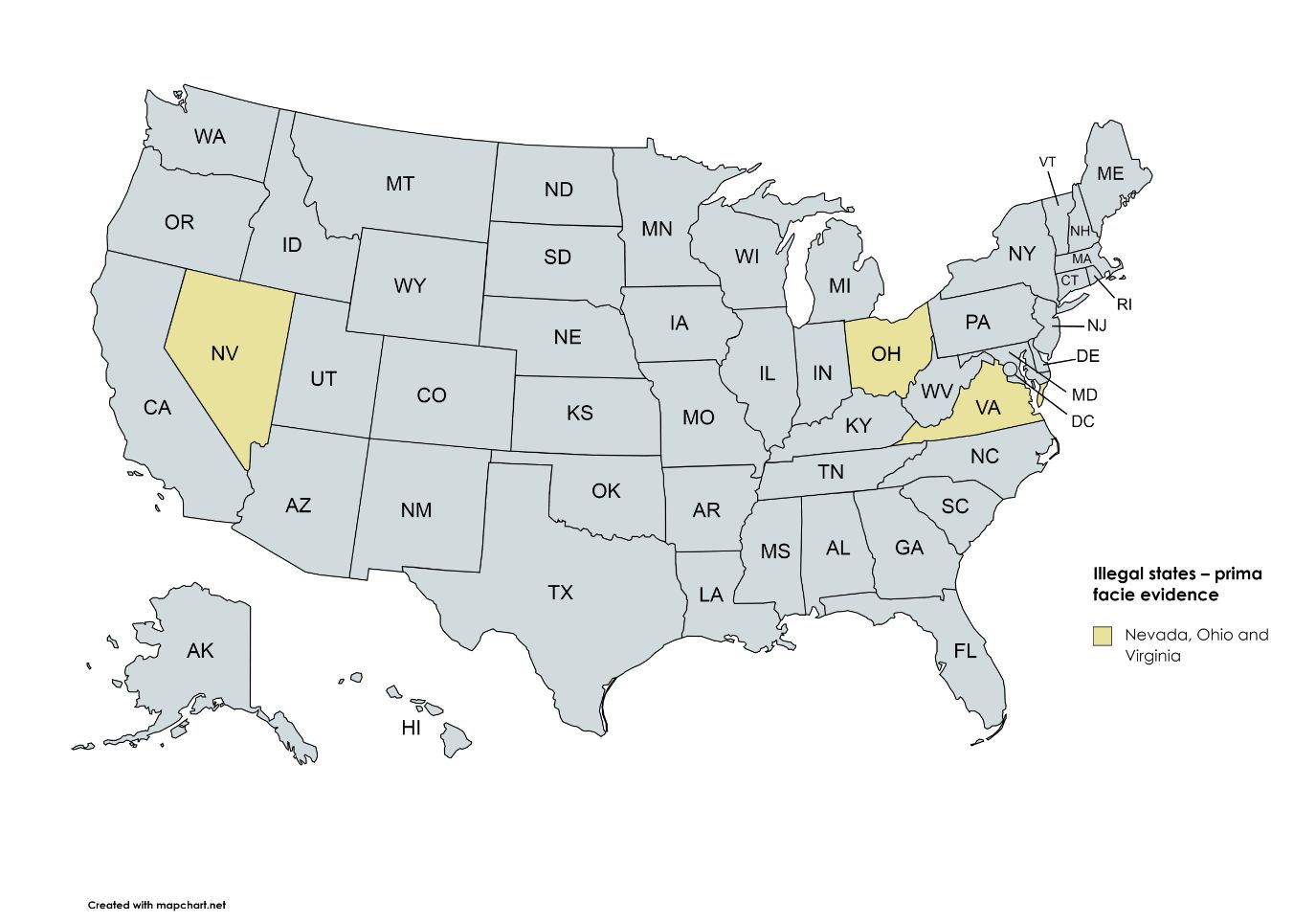
Nevada
In Nevada, it is illegal to possess lock picking tools with the intent to use them for breaking into a building or vehicle. Lock picking tools are considered “burglary tools,” which are illegal to possess without a legitimate reason, such as being a licensed locksmith. The penalty for possessing burglary tools can result in fines and jail time.
Ohio
In Ohio, possession of lock picking tools with criminal intent is a felony. In Ohio, possessing lock picking tools with the intent to use them for a criminal offense is a first-degree misdemeanor, punishable by up to six months in jail and a $1,000 fine.
Virginia
In Virginia, it is illegal to possess burglarious tools, including lock picks, with the intent to use them for breaking or stealing. Possession of lock picking tools with the intent to commit a crime is considered a Class 1 misdemeanor, punishable by up to 12 months in jail and a $2,500 fine. The severity of these penalties reflects the state’s desire to deter criminal activity and protect public safety.
Are Lock Picking Kits Illegal?
Are lock pick sets illegal?; The most common question asked by people curious about lock picking.
Are Lock Picking Kits Illegal or legal, varies depending on the country and jurisdiction. In some places, possession and use of lock picking tools may be legal as long as they are not used for illegal purposes, such as breaking into someone else’s property without permission.
In other places, possession of lock picking tools may be considered illegal or restricted to authorized personnel, such as locksmiths or law enforcement officers.
It is important to research lock pick legality and understand the laws and regulations in your specific location before purchasing or using lock picking tools. It is also important to use lock picking tools responsibly and only for lawful purposes. Hope this clears the confusing query “Are lock picking tools illegal”. If not then the following reasons will clarify it further.
Reasons why it is illegal to own Lock Pick Sets & Bump Keys for Lock Picking?
1. Criminal intent
Criminal intent is the reason why it is illegal to own or carry lock picking sets in many places. While these tools like bump keys could be used by criminals to break into places and steal property, not everyone who owns them has criminal intentions. Many people buy them out of curiosity and to learn how locks work. However, because they could be used for illegal purposes, possession and use of lock picks are often regulated by laws of lockpick legality.
2. Violation of Law
One reason why owning lock picks/bump keys can be illegal is due to federal law. According to 18 U.S.C. § 922(g)(1), it is unlawful for anyone who has been convicted of a crime punishable by imprisonment for more than one year to possess a firearm or ammunition. Possession of lock picks, bump keys, or similar tools that are specifically designed to unlock locks without the proper key or combination can be considered a violation of this lockpick legality law because they can be used to enter a property without permission. It is not necessary to have used the tools for illegal purposes, and mere possession of them can lead to criminal charges.
3. Destruction Tools and Theft
Lock pick sets and bump keys are considered tools of destruction and theft because they are designed to break into safes, doors, cars, etc. If someone uses these tools to enter a house or car without permission, it would be considered breaking, which is a crime in every state in the US.
Legal Consequences/Punishment for Lock-Picking in the US
The punishment for lock picking varies in the US, depending on the lock pick laws by state and the circumstances of the crime. In most states, it is considered criminal trespass, which can result in fines, jail time, or both.

However, in states like California, it can be a misdemeanor or a felony depending on the intent to commit a crime or damage property. Punishment for a felony can range from expensive fines to prison time, depending on the severity of the crime and the offender’s criminal record. In states like Florida, lock picking can be charged as burglary, resulting in up to 15 years in prison. In New York and California, possessing lock-picking tools with the intent to commit a crime is a felony offense.
Consultation with an attorney in your state is recommended for accurate information on the law and potential punishments.
Is Lock Picking Legal in Exceptional Circumstances?
Regarding the legality of lock picking, there may be certain exceptions or allowances for certain circumstances. For example, some states may allow licensed locksmiths or law enforcement personnel to pick locks in the course of their work. Additionally, there may be exceptions for emergencies, such as a person being locked in a room with no other means of escape
-
Licensed Locksmiths
One common exception is for licensed locksmiths who are authorized to pick locks as part of their profession. They are typically required to undergo training and certification to ensure they have the necessary skills and knowledge to safely and legally pick locks.
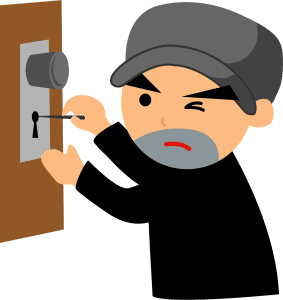
Example: A licensed locksmith in California is authorized to pick a lock if a customer requests their services to open a locked door. The locksmith has to show their license when requested and keep a record of each job they complete.
-
Law Enforcement Personnel
Another exception could be for law enforcement personnel, who may be authorized to use lock picking techniques in certain circumstances, such as during a search or to gain entry to a building or vehicle in an emergency.

Example: A police officer in New York City may be authorized to use lock picking techniques to gain entry to a building or vehicle during an emergency, such as a fire or a medical emergency.
-
Lock sport and Hobby
There may be exceptions for individuals who are picking locks for non-criminal purposes, such as for educational or recreational purposes. For example, “lock sport” enthusiasts may engage in competitive lock picking events or use lock picking as a hobby. However, it’s important to note that even if an activity is not illegal, it may still be considered suspicious behavior if done in certain contexts, such as near a building or property that the person does not have permission to access.

Example: A hobbyist in Ohio may participate in lock picking competitions as a locksports techniques‘ enthusiast, as long as they are not breaking into someone else’s property or engaging in any other criminal activity.
Important Note
It’s important to research and understand the specific laws and regulations related to lock picking in your jurisdiction to ensure that you are not breaking any laws or engaging in suspicious behavior.
Conclusion
In conclusion, lock picking is a highly controversial topic in the United States, and the legality of owning and using lock picks (lockpick legality) and bump keys varies according to lock pick laws by state. While lock picking can be a useful skill in certain circumstances, it is important to understand the potential legal consequences of owning and using these tools and lock picking laws..
The fact remains that whether it is legal or illegal to pick a lock depends on the individual circumstances and the applicable state and federal laws. As such, it is important to consult with an attorney in your state to determine the legal status of lock picking in your area. So, is lock picking illegal? The answer is not so clear-cut, but it is important to approach it with caution and awareness of the potential legal implications.
FAQ’s
In what states are lockpicks illegal?
Nevada, Ohio, and Virginia are the states which are lockpick illegal. These states have laws that restrict the possession of lock picking tools with the intent to use them for criminal activities.
Is lockpicking illegal in the US?
Lock picking is generally considered illegal in the US if it is done with the intent of committing a crime, such as breaking. The laws regarding lock picking vary by state and the circumstances of the situation. If lockpicking is done with the intent of learning, as a hobby, or as a sport, it is considered legal in the majority of states.
Are lock picking sets illegal?
Lock picking tools can be bought and owned legally in most places globally, including the US. Nonetheless, certain states like Illinois, Mississippi, Nevada, Ohio, Tennessee, and Virginia have specific laws that limit or forbid the use of lock-picking tools.
Is it legal to own lock picks?
It is legal to own lock picks generally but in some states it is totally illegal. Legal states allow owning lock picks but with a must show intent.
Is it illegal to carry a lock pick set?
No, it is not illegal to carry a lock pick set if it is carried with an intent to use it for legal purposes.
